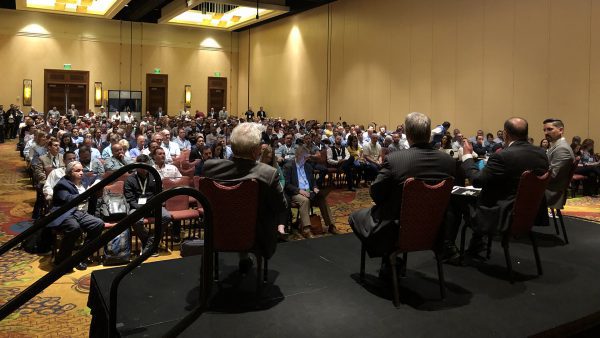SAN ANTONIO, TX–While negotiations are still ongoing in the U.S. Department of Commerce’s intention to withdraw from the tomato suspension agreement with Mexico, one thing is for certain: Unless there’s an 11th hour resolution to negate it, the tomato market as we have known it for more than two decades a will change.
And exactly how it will change is up in the air.
A panel put together to discuss what to expect didn’t have solid answers for the standing-room-only crowd at the Viva Fresh Expo April 26, but it did have some guidance:
- Growers: pricing will be complicated.
- Importers: talk to your banker.
- Wholesalers: sales beyond the first transaction are uncertain.
- Retailers: expect shorter supplies while growers realign and possibly consolidate.
- Consumers: expect higher prices for not only tomatoes, but other complementary items.
The panel, which hosted Lance Jungmeyer, president of the Fresh Produce Association of the Americas; J.O. Alvarez, Jr., president of J.O. Alvarez Inc., a Laredo, TX-based customs broker; and Jason Klinowski, agriculture and food law attorney at Wallace Jordan Ratliff & Brandt LLC in Birmingham, AL, was moderated by Dante Galeazzi, president and CEO of the Texas International Produce Association.
“I think one of the biggest challenges for the industry is that there’s a lot of unknowns as we approach this May 7 deadline,” Galeazzi said. “So the question is, how many of those unknowns will be answered come May 6 or May 7?”
Klinowski said even if no deal is made, there most likely will be a change in how the U.S. and Mexico do business in tomatoes.
“Assuming no suspension agreement deal is made,” he said. “The reality is when it goes away, even if it’s only briefly, we’ll go back to the statues and rules and regulations that were in play back in 1996. We’ll basically have to dust off the books we haven’t had to look at in a long time. The infrastructure is there. It’s just one that the industry has not had to utilize.”
The tomato market, in essence, will go back to a free market – without a floor price — with duties assumed to be at 17.56%.
Alvarez said customs brokers should already be talking to their bankers about letters of credit, and a minimum $50,000 bond to accommodate the expected duties on imported tomatoes.
When asked for the latest in negotiations, Jungmeyer said sticking points included unreasonable “crazy” changes in the agreement that included rejected loads being returned in full at shipper’s expense, and restrictions on second and third seller situations, such as a wholesaler selling for a loss.
The panel also discussed timing of the withdrawal, which comes when Mexican growers are winding down their seasons and planning for the next. If the uncertainty persists, it could affect supplies going into the winter and spring.



